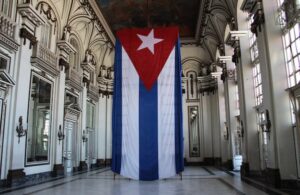Bill Hackwell
Some years ago I was talking to a Cuban doctor about what a remarkable achievement it was that Cuba was able to eliminate Malaria in 1973. He took the discussion in stride and said that it didn’t mean much until we eradicate Malaria in the entire world.
Today Cuba is proving once again that their view of health and battling diseases is one that is global in scope and despite living under the unilateral 60-year-old US blockade, with additional sanctions coming their way daily, they always rise to the occasion and go beyond their own capacity to assist when a disaster or a global pandemic hits like the COVID-19 gripping the world now.
Cuba helps Britain
Yesterday the Cuban government authorised a British cruise ship carrying five people with confirmed cases of COVID-19 and another 40 in isolation with flu-like symptoms, to dock at a port on the island. Since the end of February the MS Braemar, with 682 passengers and 381 crew members aboard, most of them from Britain, has been floating around the Caribbean after being turned away by a number of countries, including Barbados and the Bahamas, which are both part of the British Commonwealth—an irony not lost on some passengers. “We should all remember what #Cuba has done for us, stepping in when none of the British Commonwealth countries and protectorates in the region offered any help,” tweeted one passenger aboard the Braemar, Steve Dale.
Cuba is now collaborating with the British government to attend to those who are infected while arranging evacuation flights from Cuba to the UK for all the passengers as soon as possible.
Britain’s Foreign Minister Dominic Raab expressed gratitude on Tuesday (March 10) in parliament to Communist-run Cuba for offering a safe haven to the Braemar, after several Caribbean ports refused to let it dock.
Cuba sends help to countries around the world
A major contribution that Cuba is making in the struggle against COVID-19 is with its anti-viral medicine Interferon Alpha 2B, developed in 1986. It has proved to be effective for viruses with characteristics similar to those of coronavirus, and is credited with saving 1,500 people from the virus in China alone. Alpha 2B is being produced in large quantities in China in a Cuban–Chinese joint venture not based on profit but for making supplies available to all countries.
The Cuban medication Interferon Alpha 2B has been requested by more than ten countries.
Socialist Cuba has also sent a medical team to Italy to help the EU-member fight coronavirus. Cuban medical personnel have also been sent to Venezuela, Jamaica, and other nations along with supplies of the Interferon. Meanwhile, Cuba’s producer of medicines Bio-CubaFarma is producing 21 other compatible medicines for the treatment of complications that may arise in patients with COVID-19.
Meanwhile, the US approach …
On the other end of the spectrum from Cuba’s collaborative global approach to fighting disease and illness is the entitled one nation, where’s the money to be made, the approach of the US. As more cases add up in the US not only is there no national plan there isn’t even a serious attempt to test to find out who is ill and who isn’t. States and communities are left to figure it out by themselves, hundreds of thousands of homeless, people locked up in prisons and uninsured are completely vulnerable and exposed to the disease while the focus and direction is geared towards protecting the economy and in particular the stock market. The Trump Administration had two and a half months to get it together since the outbreak of the virus manifested itself in Wuhan China, instead, they went into racist finger-pointing and denial. In January the World Health Organisation had testing kits available that they offered to the government but Trump declined so that the pharmaceutical corporations could produce them for profit and we are still waiting. The initial cost for the testing was around $3,000.
… and at the other end, Cuba’s selfless help
The gesture that Cuba made to help the people on the British cruise ship came with no strings or pats on the back needed. It is a small incident in the big picture of what is going on in the world now but it says a lot about Cuba’s concept of the community of nations. In explaining the gesture Cuba’s Ministry of Foreign Affairs issued a statement that said, “These times call for solidarity, understanding health as a human right and strengthening international cooperation in order to address our common challenges; values that are inherent to the humanist practice of the Cuban Revolution and people”.
A March 18, 2020 datelined Granma report, headlined “A Safe Port Amidst Adversity” said:
“The humanitarian and altruistic dimensions of the events could make them stuff of a movie scene. The crew of the MS Braemar, owned by the British Fred Olsen cruise line, spent several days sailing the Caribbean with passengers aboard suffering coronavirus infections.
“Despite diplomatic efforts by the UK government, the ship was refused entry to several ports in the region. But there was nothing fictional about the urgent situation of passengers, including the sick whose lives were endangered, with the rest facing possible infection, in the middle of the ocean.
“Cuba said yes, and offered a safe port in the midst of adversity, with modesty, not seeking headlines in the media, for absolutely nothing in return. Such a decision perhaps generated incomprehension on the part of some, those who are unaware of the value of a helping hand during a catastrophe.
“But, for most Cubans, the opportunity to help fills us with patriotic pride, with the emotion only understandable by women and men of good will in all latitudes. Because in ‘times of coronavirus,’ the words ‘help, cooperate, work together’ should be the norm, across the planet. Because human civilisation should understand, once and for all, that only together can we overcome common challenges and tragedies.
“Cuba, true to its principles, could not act otherwise, nor is this the first time we have done so. Solidarity is in the genes of the Cuban people. It is part of our unique identity and has written memorable chapters in our history.
“Perhaps for these reasons, in the time of Covid-19, the eyes of the world look hopefully to Cuba, and our people, who despite hardships and a fierce blockade, did not hesitate to respond.”
Cuba’s solidarity with the people of the world
Other countries are sending thousands of military personnel to Europe to conduct the most extensive maneuvers since the Cold War, while leading an insulting campaign against Cuban medical collaboration around the world. Cuba’s response? An army of white coats at the service of the dispossessed: more than 400,000 health professionals who, over 56 years, have carried out missions in 164 nations.
Women and men from this Caribbean island have faced Ebola in Africa, blindness in Latin America and the Caribbean with Operation Miracle, and cholera in Haiti. Twenty-six Cuban brigades from the Henry Reeve International Contingent of Doctors Specialised in Disasters and Major Epidemics—recognised with the Dr. Lee Jong-wook Public Health Award, granted by the Executive Council of the World Health Organisation—helped during difficult times in Pakistan, Indonesia, Mexico, Ecuador, Peru, Chile and Venezuela, among others.
Martí said: “Cuba does not go around the world begging. She goes as a sister and works with authority as such. By saving herself, she saves.” Then and now, and into the future.
[Bill Hackwell is an organiser with the International Committee for Peace Justice and Dignity and an editor for the English edition of Resumen Latinoamericano. We have expanded this article with inputs from an article by Countercurrents Collective]




